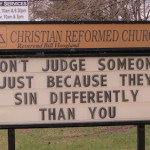We run our website the way we wished the whole internet worked: we provide high quality original content with no ads. We are funded solely by your direct support. Please consider supporting this project.
World Vision, Gay Marriage & Judgment
Courtney “Coco” Mault via Compfight
Yesterday World Vision announced that it is now allowing gay Christians in legal same-sex marriages to be hired as well as gay Christians who follow their policy of abstinence outside of marriage. The social media reaction is quite varied as you might expect, ranging from support to extreme statements of judgment and derision toward those who are leading World Vision and the LBGTQ community. Rather than responding to their decision regarding hiring practices, we wanted to use this as an opportunity to reflect on how Christians so easily slip into judgment in matters like this. Here is an excerpt from Greg’s book Repenting of Religion:
We cannot judge others because it is not our place as humans to function as the center and judge of other people. But we also cannot judge others because we ourselves are sinners who deserve judgment. If we don’t want to be judged, Jesus says, we must not judge. The measure of judgment we give is the measure with which we shall be judged. …
This is why human judgments are always hypocritical. The act of judging others subjects us to the same judgment we apply to them. The hypocrisy of our judgment is manifested in the fact that it is always selective and self-serving … Our knowledge of good and evil is always bent in our favor. Because we are trying to fill the vacuum in our spirit with our judgments, we amplify the sins of others while minimizing our own sins.
In Matthew 7, however, Jesus teaches us to do the exact opposite. We should consider our own sins to be logs and other people’s sins to be specks! The picture of people with tree trunks sticking out of their eyes looking for dust particles in other people’s eyes is absolutely ludicrous—and that is the point. We are finite, sinful human beings, and as such, we have no business setting ourselves up as moral police of others, acting as though we know the state of other people’s hearts and concluding that we are in any way superior to them. While we can discern the impact of behavior, the only conclusion we are allowed to know about a person’s heart is that he or she has infinite worth before God. …
If one struggles in this area [of judgment], it may help to imagine a life-story that puts a person’s sin in a context in which it is rendered into a dust particle, even when it’s destructive and must be stopped. Perhaps the person was abandoned or abused as a child. Perhaps the person has a brain defect that causes sociopathic behavior. Perhaps the person has never been loved or was psychologically damaged by other means. Perhaps, along with all this, he or she is undergoing terrible demonic attacks. Unless we have taken the time to incarnate ourselves into the person’s life, we cannot know. And even when we know his or her story intimately, there is still much we cannot know.
What we can know is that we have tree trunks in our own eyes that keep us from seeing accurately, so we must, on the authority of Jesus Christ, view the person’s sin as mere dust particles in comparison to our own. And we must do so while ascribing to him or her the unsurpassable worth Christ ascribes to us.” (109-111)
Category: General
Tags: Gay Marriage, Judgment, World Vision
Topics: Ethical, Cultural and Political Issues
Related Reading

Revolting Against Judgment
A few years ago, I committed to blessing all people at all times. (See yesterday’s post for more about this.) The first thing I noticed was how many “non-blessing” thoughts I had about people. I wasn’t very aware of it before, but my brain often created a running commentary on the people I observed or…

3 Traits of a Jesus Kind of Church
A Jesus kind of church (See an introductory post on this here) is called to represent God, just as Christ did. The church is Christ continuing to manifest the true God. Bonhoeffer put it this way, “The Church is not a religious community of worshippers of Christ but is Christ Himself who has taken form…

Counter-Cultural Community
Jessica Lucia via Compfight On Tuesday Greg tweeted, “We inevitably acclimate to our environment. We can’t hope to be counter-cultural unless we’re embedded in a counter-cultural community.” Surely almost all Christian leaders would agree with this. But what does a counter-cultural community look like? How do we relate to one another and to the world…

Finger-Pointing and the Impulse to Judge
To no one’s surprise, yet to the sadness of many of us, several Christian spokespeople, including James Dobson, Mike Huckabee and Bryan Fischer, are blaming the shootings in Newtown, Conn, on abortion and gay marriage. This is sadly reminiscent of Jerry Falwell’s hurtful response to 9/11 when he divined that “the pagans,” “abortionists,” “feminists,” “gays,” “lesbians,”…

Repent! … From the Sin of Religion
People often think that being Christian is about “being religious,” but loving others in the way that Christ instructs us is about as far removed from religion as anything could be. Religion, as I use the term, is a system of beliefs and behaviors one embraces as a means of getting life—whether this be feeling…


